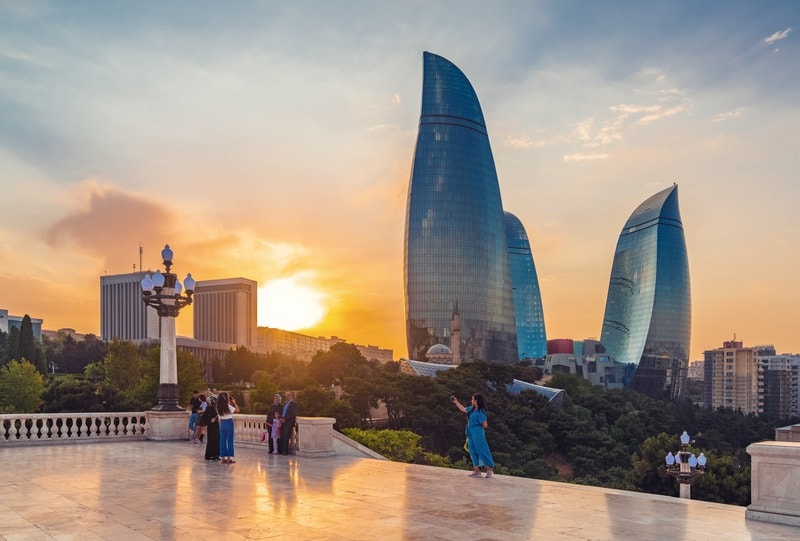Baku – the Azerbaijan capital city is a historical city located on the western shores of the Caspian Sea, south of the Absheron Peninsula. Baku is also called the city of winds. It has a dry subtropical climate and the total area is 2130 km2 and consists of 11 administrative districts.
Due to the area and population, Baku is considered the biggest city of Azerbaijan. The population of Baku officially known as 2.5-3 million people, and unofficially 3.5-4.5 million which consists of almost the half amount of Azerbaijan population.

When Baku Became Azerbaijan capital?
The first time in the Azerbaijan history Baku became Azerbaijan capital in the 13th century, during Shirvanshah’s dynasty. Before that, the capital was the city of Shamakhi, which is located 122 km far from Baku. Due to the suitable geographical location of Shamakhi, for many years this city was Azerbaijan capital till the time when it happened a big earthquake that destroyed completely the city. After this disaster, the king of Shirvanshahs’ decided to move the capital of Azerbaijan from Shamakhi to Baku and starting from that time Baku started to develop. The factor of being a port city had a big positive impact on the progressive development of the city as well.
About Baku
Ancient Baku was once a center of trade and oil production. The history of oil production and its spread to the surrounding areas dates back to the time of the Babylonian Empire. “Clay was used as a binder in the walls of Babylon. This solution, known as fuel, was exported from the Absheron Peninsula to Iran, Iraq, and India,” writes Sarah Searight in her book England and the Middle East. In 700-600 BC, oil was used in every sphere of daily life, including medicine, heating, and lighting.
Baku is a bridge between East and West, where the different cultures and civilizations have merged for centuries. Along with Central Asia and the Middle East, Baku is known as an exporter of oil and salt, maintaining close economic and cultural ties with other areas, as well as by sea trade. Baku has passed a unique path of development and become a center of culture and trade.
At present, the social and public life of Baku is very dynamic. Important conferences, festivals, exhibitions, sports competitions, and other international events held here increase the importance of Baku in the region. The greatest wealth of the city is its inhabitants. The hospitality and sincerity of the residents of the capital leave an unforgettable impression on everyone. As early as 1882, the Nobel brothers, owners of the largest local oil company, said, “Baku can light up the whole world and add color to it.”


